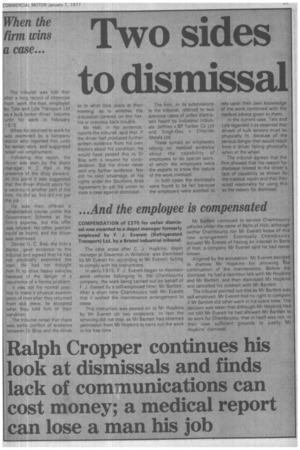...And the employee is compensated
Page 29

If you've noticed an error in this article please click here to report it so we can fix it.
COMPENSATION of £370 for unfair dismissal was awarded to a depot manager formerly employed by F. J. Everett (Refrigerated Transport) Ltd. by a Bristol industrial tribunal.
The case arose after C. J. Hopkins, depot manager at Staverton in Wiltshire, was dismissed by Mr Everett for, according to Mr Everett, failing to comply with his instructions.
In early 1975, F. J. Everett began to maintain some vehicles belonging to the Chambourcy company, the work being carried out on behalf of F. J. Everett by a self-employed fitter, Mr Bartlett. After a short time Chambourcy told Mr Everett that it wished the maintenance arrangement to cease.
This instruction was passed on to Mr Hopkins by Mr Everett on two occasions. In fact the servicing did not stop. as Mr Bartlett had obtained permission from Mr Hopkins to carry out the work in his free time. Mr Bartlett continued to service Chambourcy vehicles under the name of Barts of Holt, although neither Chambourcy nor Mr Everett knew of this new arrangement. Eventually Chambourcy accused Mr Everett of having an interest in Barts of Holt, a company Mr Everett said he had never known.
Angered by the accusation, Mr Everett decided to dismiss Mr Hopkins for allowing The continuation of the maintenance Before the dismissal, he had a two-hour talk with Mr Hopkins and Mr Bartlett, and then dismissed Mr Hopkins and cancelled his contract with Mr Bartlett.
The tribunal pointed out that as Mr Bartlett was self-employed. Mr Everett had no right to cornpain if Mr Bartlett did other work in his spare time. The decision was taken that although Mr Hopkins had not told Mr Everett he had allowed Mr Bartlett to do work for Chambourcy, that in itself was not, in their view sufficient grounds to justify Mr Hopkins' dismissal.




















































































